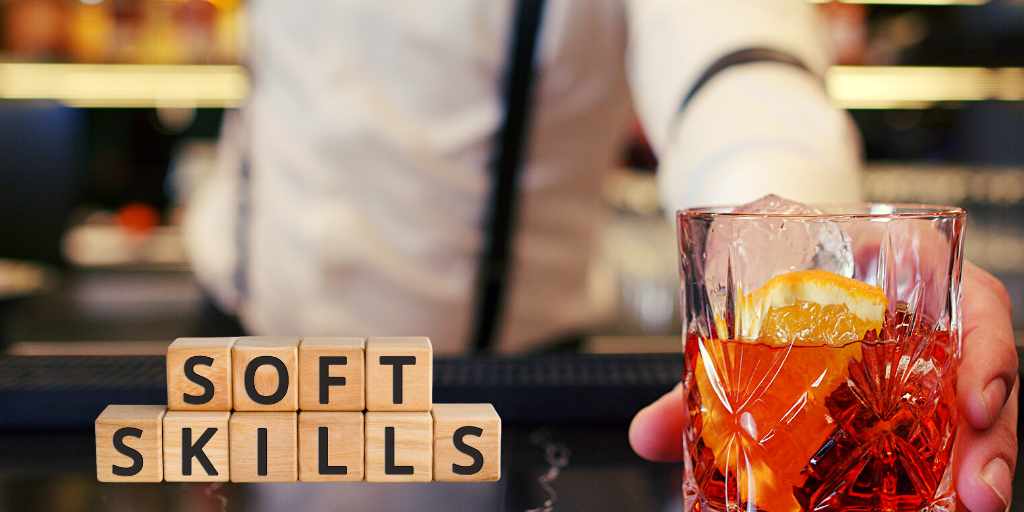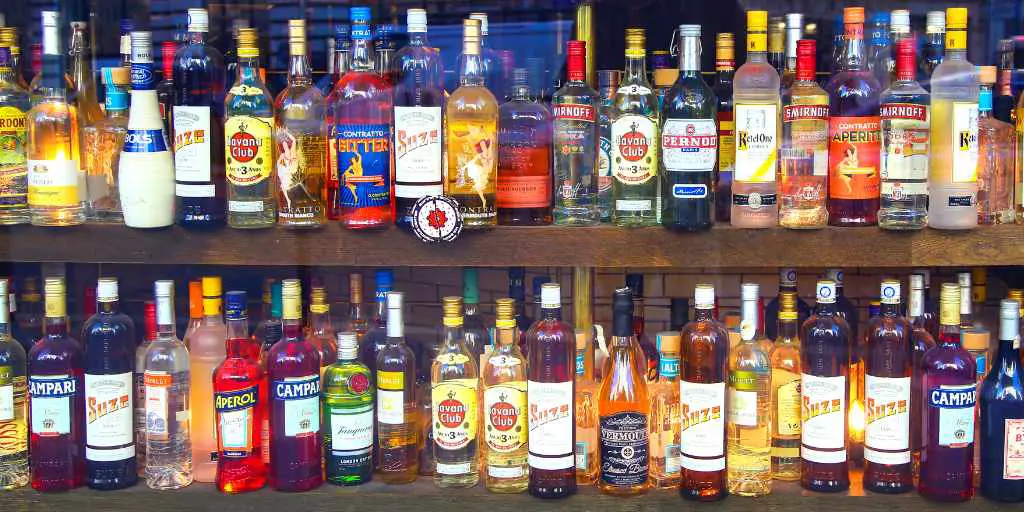In the bartending world, mastering cocktails is just the tip of the iceberg; the essential soft skills in bartending truly set you apart. This article highlights these often-overlooked aspects that your bartending skills can make or break your bartending job.
Key Takeaways
- Soft skills are as critical as hard skills in becoming a successful bartender.
- Effective communication and excellent customer service are non-negotiable for customer satisfaction.
- Adaptability and problem-solving are crucial, especially during busy nights.
- Continuous learning, whether through online courses or from other bartenders, can keep you updated on seasonal trends and new drink recipes.
Why Soft Skills Matter
While technical skills are crucial for bartender jobs, soft skills often differentiate between a good and a great bartender. These skills enable you to provide excellent customer service, ensure customer satisfaction, and work efficiently with fellow employees.
The Importance of Soft Skills in Bartending
You might be surprised to learn how much your soft skills can impact your success behind the bar. In a fast-paced environment, bartenders perform various job duties, from serving customers alcoholic beverages to maintaining bar cleanliness. But your soft skills will keep bar patrons returning, turning them into repeat customers.
Customer Service
Exceptional customer service is the cornerstone of any successful bartending career. From the moment you greet customers to when they leave, your friendly, positive attitude, and welcoming environment can make all the difference.
Communication
Clear and effective communication is more than just talking; it’s about understanding and being understood. Effective communication skills are vital, especially when taking drink orders or food orders from bar customers or communicating with the head cook and wait staff.
Don’t Forget The Hard Skills, Though
While soft skills are indispensable, let’s not overlook the hard skills essential for success in bartending. These hard skills often appear in the job description and are crucial for organization and efficiency bartenders will need.
Mixology Techniques
Knowing how to mix a perfect cocktail is a skill that can set you apart. Whether it’s free pouring or following drink recipes, your ability to serve alcoholic beverages in an efficient manner is crucial.
Inventory Management
Keeping track of what’s in stock and what needs to be reordered is crucial for a well-run bar. Organizational skills are key here, especially when it comes to cash management bartenders need for handling the cash register.
Cash Handling
Being able to give change and manage transactions accurately is a fundamental skill. Cash handling is often part of the job duties and a good memory is essential for maintaining composure during busy nights.
Knowledge of Health and Safety Regulations
Understanding and adhering to health and safety guidelines is non-negotiable in bartending. This includes everything from bar cleanliness to ensuring drinks served meet all health standards.
Top 10 Essential Soft Skills in Bartending
1. Active Listening
Active listening isn’t just about hearing what the customer says; it’s about truly understanding their needs.
Example: If a customer mentions they don’t like sweet drinks, recommend a cocktail that suits their taste.
Tip: Always maintain eye contact and nod to show you’re engaged. Repeat back orders to ensure accuracy.
2. Empathy
Empathy allows you to connect with your customers on a deeper level, making their experience memorable.
Example: If a customer seems down, a few kind words or a complimentary appetizer can go a long way.
Tip: Read body language and facial expressions to understand your customers’ emotional state better.
3. Adaptability
In the fast-paced environment of a bar, adaptability is key to keeping things running smoothly.
Example: If you run out of a particular ingredient, quickly think of a suitable substitute.
Tip: Always have a backup plan and be prepared to change course at a moment’s notice.
4. Teamwork
Bartending is not a one-man show; effective teamwork ensures that bartenders work a well-oiled machine.
Example: Coordinate with wait staff to ensure food orders and drinks arrive at tables on time.
Tip: Communication is key; always keep your team informed about what you’re doing.
5. Stress Management
Handling stress effectively is crucial, especially during busy hours.
Example: Take deep breaths and prioritize tasks to manage stress.
Tip: Take short breaks when possible to clear your mind and refocus.
6. Time Management
Time is of the essence in bartending, and good time management skills are vital.
Example: Use downtime to prep ingredients or clean, making busy periods more manageable.
Tip: Plan your tasks in advance and stick to the schedule as much as possible.
7. Attention to Detail
The devil is in the details, and in bartending, those details can make or break an experience.
Example: Always double-check drink orders and ensure the presentation is perfect.
Tip: Keep a checklist for complex drinks to ensure you don’t miss any steps.
8. Problem-Solving
When issues arise, your problem-solving skills can turn a potential disaster into a minor hiccup.
Example: If a customer complains about a drink, offer a quick and satisfactory solution.
Tip: Always think on your feet, and don’t be afraid to get creative with solutions.
9. Salesmanship
Being a good salesperson can significantly boost your tips and enhance customer satisfaction.
Example: Upsell by suggesting premium spirits or add-ons like a shot on the side.
Tip: Know your products well so you can make convincing recommendations.
10. Cultural Awareness
Understanding diverse cultures and preferences can make you a more professional resume that shows versatility as a bartender.
Example: If you notice a group of tourists from a particular country, suggest a popular drink in their homeland.
Tip: Stay updated on global drink trends and respect cultural differences in drinking habits.
Each of these soft skills is a crucial component in the toolkit of a successful bartender. By understanding and mastering these skills, you can set yourself apart from other bartenders and create a memorable experience for your patrons.
Case Studies: Bartenders Who Excelled Due to Soft Skills
Let’s look at some real-world examples of bartenders who have made a name for themselves through exceptional soft skills. These case studies will demonstrate the most important bartender skills in action, from communication and interpersonal skills to the teamwork bartenders need.
Sarah: The Customer Service Maven
Sarah worked at “The Cozy Corner,” a local bar known for its laid-back atmosphere but struggling with customer retention.
When Sarah took over, she implemented a new approach focused on excellent customer service. She trained the staff to greet customers warmly, remember regular customers’ favourite drinks, and create a welcoming environment.
Within months, the bar saw a significant increase in repeat customers and glowing online reviews. Sarah’s focus on customer service turned “The Cozy Corner” into one of the most popular bars in the area.
Mike: The Problem-Solving Pro
Mike was bartending during a major local event that drew in hundreds of people to “The Busy Bee,” a bar he worked at.
Just when the night was at its peak, the bar’s draft beer system malfunctioned. Instead of panicking, Mike quickly switched to a manual method, informed the customers about the issue in a friendly and transparent manner, and, after checking with his manager, made free drinks, and offered a small discount on bottled beers.
His problem-solving skills and ability to remain calm under pressure turned a potentially disastrous, busy night into a memorable experience for the patrons.
Emily: The Teamwork Champion
Emily worked at “The Trendy Tavern,” a high-end bar where the staff had a reputation for being competitive rather than collaborative.
Recognizing the importance of teamwork, Emily took the initiative to foster a more cooperative environment. She organized weekly team meetings to discuss best practices, encouraged bartenders to help each other during busy periods, and even created a shared tips system that rewarded teamwork.
Her efforts improved the work environment, leading to faster service and higher customer satisfaction.
These case studies demonstrate that mastering essential soft skills in bartending can have a transformative impact on both your career and the establishments where you work. Whether it’s providing excellent customer service like Sarah, problem-solving like Mike, or fostering teamwork like Emily, these skills are the building blocks of a successful bartending career.
Wrapping It Up: The Skills You Can’t Afford to Ignore
Mastering essential soft skills in bartending is not just an option; it’s necessary for anyone looking to excel in this field. Whether new to bartending or an experienced pro, honing the right soft skills can elevate your career.




